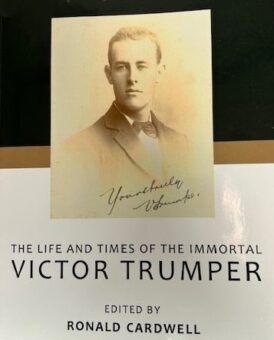Back in September 2017, “Archie Mac” shared his thoughts on the papers from the 2015 Victor Trumper symposium held in Sydney. Since then, a book titled Young Vic has been released, prompting me to revisit Roger Page’s engaging piece, Trumper in Print. While the eight-page article is mostly polished and insightful, there’s a curious set of seven words at the end of one paragraph that caught my attention:
"Considering Trumper’s celebrity status – he was as famous in his day as Don Bradman during the 1930s and 1940s and Shane Warne in more recent times – it seems incredible, at least viewed today, that no books by or about him were written during his lifetime. But cricket books were a rare commodity during the Golden Age, only Griffin’s Bat and Ball, the East Melbourne history, and the short-lived annuals and periodicals published in this era – and his {Trumper’s} lifetime was to be shortened."
This paragraph is nestled on pages 165 and 166, and the italicized words seem to clash with the initial statement, creating a paradox that weakens the overall argument. Trumper, who had already clocked in 255 first-class matches by the age of 36, with 15 seasons in Australia and five overseas tours, found his career cut short perhaps prematurely. Even if he had maintained good health, one might expect he had only 4 to 6 more years of cricket left, pushing into his forties, a time by which playing sports professionally becomes increasingly rare.
Further complicating matters, Trumper might not have been inclined to continue beyond his late-thirties. Family obligations likely loomed, pushing him towards the necessity of paid work. Labeled as an "amateur" cricketer, he didn’t receive a salary or match fees. Although he did see some financial benefit from his 1913 testimonial match, continuing in cricket would have clashed with earning a steady income through other means.
This volume of papers, which proudly states on its cover that it is "Edited by Ronald Cardwell", also notes that Julee Gould and Peter Lloyd contributed as editors without delineating who worked on what. Still, responsibility falls to Mr. Cardwell as the de facto Editor-in-Chief for this editorial slip-up, even if he didn’t personally alter the manuscript.
Roger Page isn’t alone in recognizing this addition. Mr. Cardwell has, indeed, acknowledged the error. Such a mistake casts a shadow over Page’s piece. Thus, this "Correction" aims to inform readers who hold a copy of the book to quickly cross out those seven troublesome words at the top of page 166. This simple act might shift opinions toward a more positive view of Roger’s work. If they decide to reprint the book, addressing this error could potentially restore the integrity of the content.
Finally, some skeptics might entertain fantastical theories that an external, unidentified presence—perhaps even extraterrestrial—added those words. While I’m open to the notion of aliens visiting Earth, it seems far-fetched to believe they would meddle with a cricket manuscript. Such beings would need to understand English and possess access to the original document, a highly improbable scenario. So, we can safely rule out an extraterrestrial intervention in this editing oddity.






















